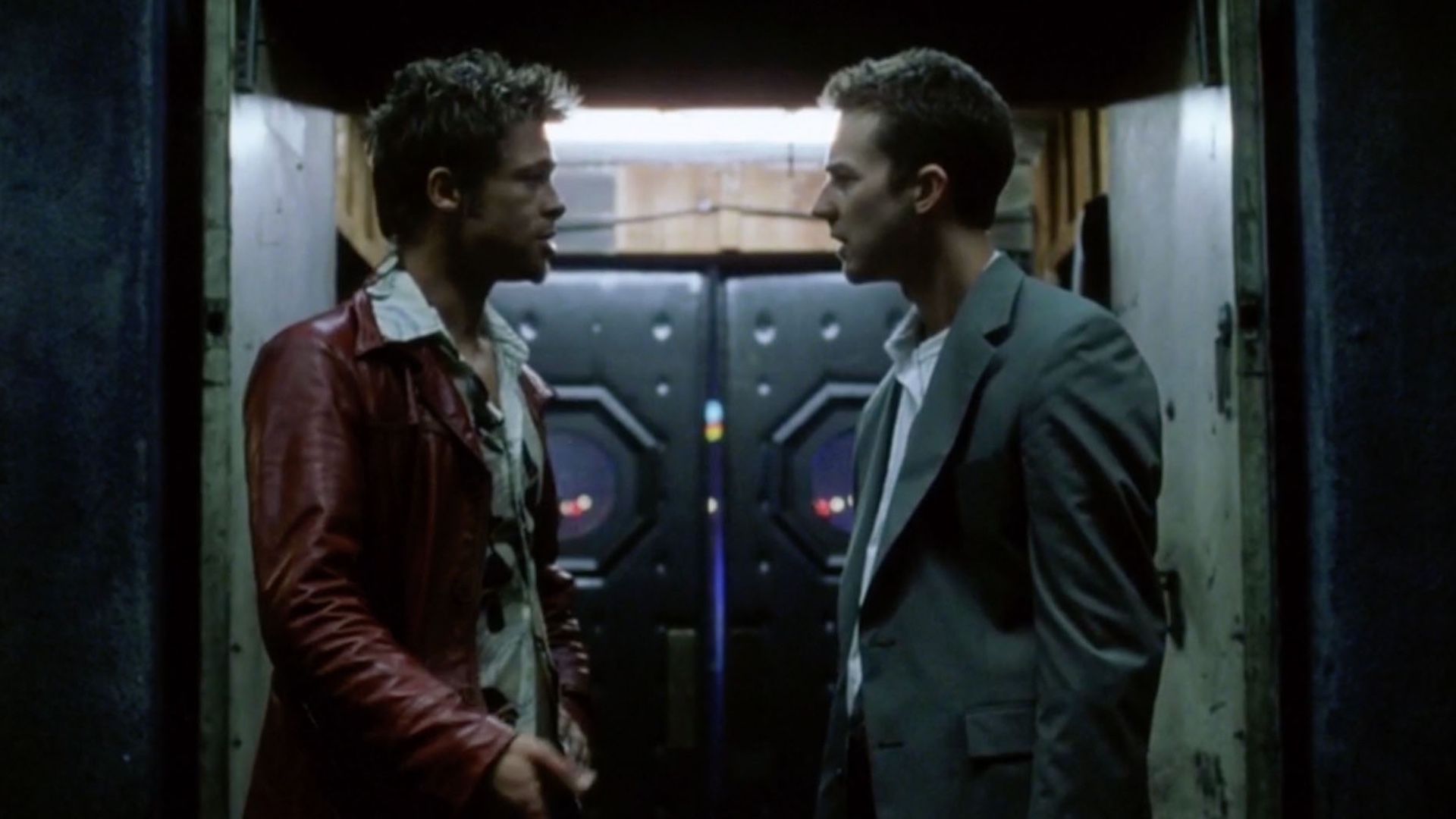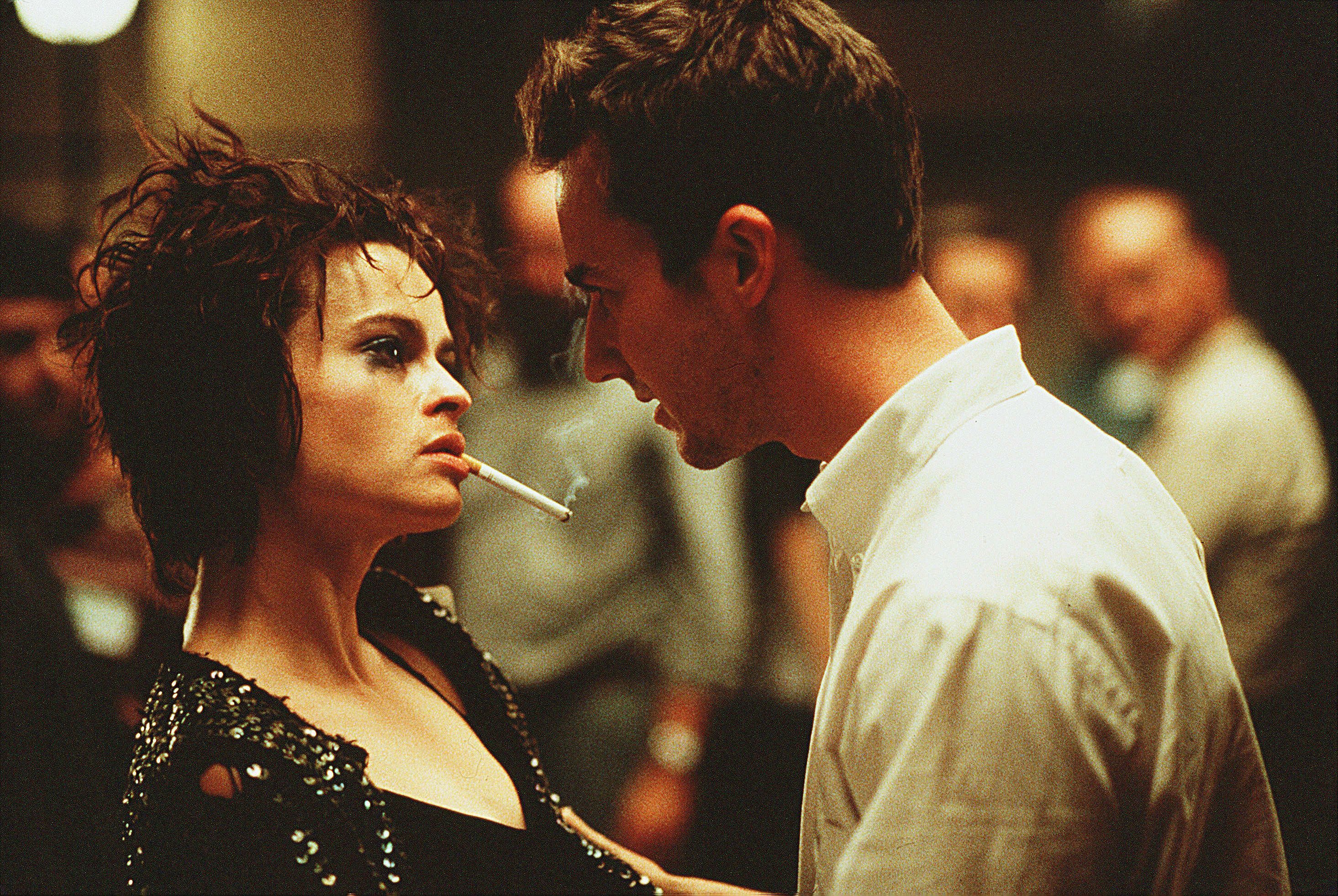Make America Fight Club Again Meme
In anticipation of the release of Mank on Dec 4th, this calendar week Collider will be presenting original essays and features diving into the work of David Fincher.
If you ever watched David Fincher's electrifying 1999 film Fight Club and thought, "We should showtime a fight club!" then congratulations, y'all take missed the indicate of Fight Club. When the moving-picture show was released twenty years ago today, it was a lukewarm success at the box office, garnering only $100 1000000 worldwide off a $63 1000000 budget. Even so, thanks to the burgeoning DVD market, Fight Lodge speedily found its audience thanks to one of the best DVD releases of all-time packed with special features and a message that resonated with audiences. Withal, that message has been misinterpreted over the years, and could be due to Fincher's desire to make Tyler Durden (Brad Pitt) so appealing that some folks didn't see what the larger picture show was going for.
For those that demand a cursory recap, Fincher's motion picture, based off Chuck Palahniuk'due south 1996 novel of the same name, follows an unnamed narrator (Edward Norton) who suffers from insomnia. Initially able to prey off support groups for the emotional catharsis they provide, that outlet is ruined when he encounters Marla (Helena Bonham Carter), who'south also a "faker." Once again cursed with insomnia, the narrator eventually crosses paths with Tyler Durden, a handsome and charismatic soap salesman who lives the way the narrator wishes he could live. After the narrator's apartment explodes, he asks for help from Tyler, and Tyler agrees to take him in on the condition that he "hit him as hard every bit he can." This interaction blossoms into Fight Club which transforms into increasingly destructive acts confronting gild. The narrator eventually realizes that he is Tyler Durden and he'southward been interacting with a figment of his imagination. He shoots himself in the head, killing Tyler but only hitting the narrator's cheek. The narrator finally accepts that he loves Marla and needs to be rid of Tyler while Tyler'due south deportment crusade the destruction of the credit bill of fare companies around them, potentially setting off a worldwide financial panic and the collapse of society.

The reason Fight Society is then easy to misunderstand is that Fincher beautifully sets up both the narrator's depression and Tyler's appeal. The narrator is a victim of capitalism, unable to forge real human being connections then instead he fills his life with stuff. Then you take Tyler who, at the outset, espouses an alluring philosophy. Tyler represents "freedom" from the modern world. He isn't dependent on anything. He steals the fat he needs for soap and works odd jobs that allow him to pull juvenile pranks on the earth. Tyler, portrayed with utmost confidence by Pitt, has everything figured out and speaks to a mail-capitalist malaise where men, trapped by crummy jobs and "cheated" out the things they were "promised" (being millionaires, picture gods, and stone stars), can merely feel live past beating the crap out of each other in darkened basements.
These elements—the grotesqueness of the narrator's existence coupled with the appeal of Tyler'south offer—are meant to bring us into the understanding of why anyone would observe a fight lodge interesting in the offset identify. Fincher puts our sympathies with the narrator, which makes sense since he's the protagonist. Nosotros have to go where he goes and Fincher knows that the audience isn't but going to automatically accept living in a dilapidated abode and punching other dudes for jollies. If Fight Gild has a problem, it's that Fincher makes that lifestyle so interesting that some audience members don't follow the turn into rejection and seeing why Tyler's philosophy is so securely flawed.
Tyler Durden'southward philosophy is essentially one that pinpoints a existent problem—the disconnect of the postmodern age fueled by capitalism and breach—and offers a child'due south solution. The narrator is offered a connection with someone existent who is actually on his wavelength—Marla—and he rejects her like a pocket-sized boy who kicks a girl in the shins because he tin can't limited that he likes her (it should be noted that the small male child'south behavior isn't worth condoning, but this is how small boys express themselves). Instead, he retreats to a kittenish impulse of a grouping of young men hitting each other in a private order while in their personal time they play pranks on the globe under the imprint of "rebellion."

Where the reaction to Fight Society falls apart isn't that the film is "unclear" (I don't think Fincher should accept to concur the audition'due south paw when he and screenwriter Jim Uhls are adequately direct in what they're trying to practise), it's that there are some audience members who tin't tell the departure between palliating the actions of Tyler and his cronies and condemning them. Considering Tyler's initial criticism lands, nosotros're supposed to follow him wherever he goes rather than seeing him for the maniacal cult leader he is. Fierce down club completely and so you can have a pair of leather pants that lasts you the residue of your life is what a teenage boy thinks about changing the world. It's not a real solution, and Tyler has no solutions. He but offers violence, chaos, and cocky-devastation and calls them wisdom.
Fight Club doesn't offering answers to the struggles of the world, but a critique. It's non a celebration of directionless men, but rather that the modernistic globe had commodified everything to the point where toxic masculinity becomes its own brand. Fourth dimension has proven that assessment disturbingly prescient every bit groups similar incels lash out at a world they feel owes them something while declining to await at their own baneful behavior. Tyler's proverb, "It's merely later on we've lost everything that nosotros're gratuitous to do anything," sounds tempting, merely it's a line near freedom for the sake of self-indulgence rather than responsibility towards others. That's why the narrator'southward arc works at the cease. He has rejected this mewling, selfish sensibility to open up himself upward to Marla. Tyler Durden never once offers emotional connexion only merely the illusion of it when it comes later a physical chirapsia.
If a grouping of people consistently misses the point of Fight Lodge, does that brand Fight Society a bad movie? Does it undermine its core theme? I don't think that it does considering information technology'due south not like the film is universally misunderstood or that the Fincher and Uhls didn't know where they wanted to take this story. What Fight Order understands is that the modern male is in an incredibly tenuous place when he becomes disconnected from his own emotions and good for you means of expressing those emotions. The narrator starts the motion-picture show not looking for violence, but simply for an emotional outlet and in a darkly comic mode goes to a support group. Just what he'due south actually looking for is emotional connexion, and while a fight lodge may offer memorable rules, it offers neither truth nor agreement, only violence.
About The Author
Source: https://collider.com/what-is-fight-club-really-about-explained/

0 Response to "Make America Fight Club Again Meme"
Post a Comment